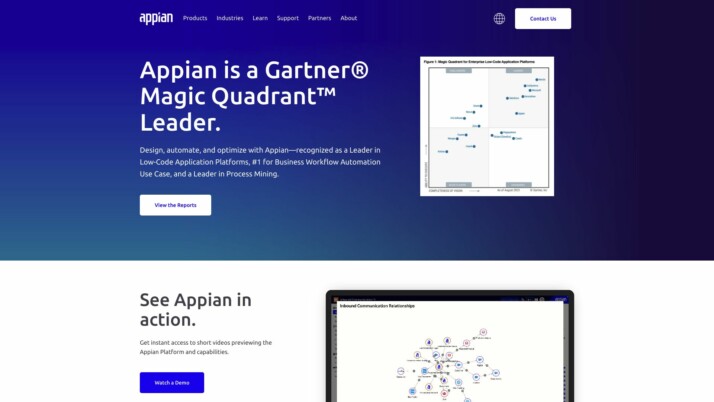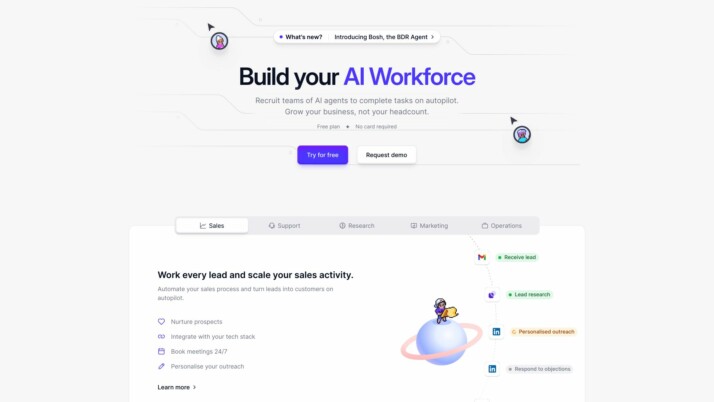Appian vs. Relevance AI: Choosing the Right AI Automation Platform
AI-powered automation transforms business workflows, but choosing the right platform remains a challenge. This comparison explores Appian vs. Relevance AI, and SmythOS, three leading solutions for integrating AI into enterprise processes. We examine their key features, development environments, and deployment options to help you select the ideal tool for your organization’s needs. Whether you seek to enhance existing systems, rapidly prototype AI agents, or build sophisticated multi-agent workflows, this analysis provides the insights to guide your decision and unlock the full potential of AI in your business.
Appian Overview
Appian delivers a powerful low-code platform for building AI-enhanced business applications. The platform empowers both developers and business users to rapidly create intelligent automation solutions without extensive coding. Appian’s AI capabilities integrate seamlessly into its core process automation and case management functionalities.


Appian delivers a powerful low-code platform for building AI-enhanced business applications. The platform empowers both developers and business users to rapidly create intelligent automation solutions without extensive coding.
The Appian platform excels at enabling enterprises to leverage AI for document processing, email routing, and enhancing business workflows. Its low-code AI Skill Designer allows users to create custom AI models for tasks like document classification and data extraction. Pre-built AI capabilities include integration with services like OpenAI for natural language processing. Appian’s focus on enterprise-grade features makes it well-suited for large organizations in regulated industries seeking to adopt AI.
Appian emphasizes data privacy and security in its AI implementations. All AI models and data remain within the customer’s control, addressing common concerns around data protection when adopting AI technologies. The platform also provides detailed audit logs and explainability features to maintain transparency in AI-driven processes.
Appian emphasizes data privacy and security in its AI implementations. All AI models and data remain within the customer’s control…
While Appian offers robust AI integration capabilities, it may not be ideal for organizations seeking a dedicated AI agent development environment. The platform’s strengths lie more in enhancing existing business processes with AI rather than building standalone intelligent agents. Users looking for advanced features like multi-agent collaboration or autonomous problem-solving may find Appian’s offerings somewhat limited in those areas.
Appian’s low-code approach and enterprise focus position it as a solid choice for businesses looking to augment their existing systems and workflows with AI capabilities. The platform enables rapid development and deployment of AI-enhanced applications while maintaining the governance and security features critical for enterprise environments.
Relevance AI Overview
Relevance AI empowers users to build and deploy Large Language Model (LLM)-powered AI agents and tools with minimal coding. The platform’s low-code environment enables rapid development, typically within minutes, catering to both technical and non-technical users.


Relevance AI’s multi-provider support allows seamless integration and switching between various LLM providers, offering flexibility and adaptability. The built-in vector store enhances data handling capabilities, while the magic deployment feature eliminates infrastructure and scaling concerns through a fully managed service for LLM features.
The platform’s key strengths include customizable AI agents, AI-powered tools for data analysis and task automation, and ready-to-use templates for common tasks. These features make Relevance AI suitable for a wide range of industries and use cases, from enhancing customer service to streamlining data processing workflows.
Relevance AI empowers users to build and deploy Large Language Model (LLM)-powered AI agents and tools with minimal coding. The platform’s low-code environment enables rapid development…
Relevance AI’s vision centers on democratizing access to advanced AI technologies. By providing a user-friendly platform that balances powerful capabilities with ease of use, they aim to enable businesses of all sizes to leverage AI for improved efficiency and innovation. However, users should consider potential limitations in scalability and customization options when evaluating the platform for enterprise-level implementations.
Overall, Relevance AI offers a compelling solution for organizations looking to quickly implement AI-powered solutions without extensive technical expertise. Its focus on accessibility and rapid deployment makes it particularly attractive for businesses seeking to explore AI applications or enhance existing processes with intelligent automation.
Feature Comparison
SmythOS and Relevance AI offer powerful platforms for building AI agents, but with some key differences in capabilities. SmythOS provides a more comprehensive set of features for developing autonomous, multi-agent systems. Its visual drag-and-drop interface enables rapid creation of complex AI workflows without coding. SmythOS also offers robust multi-agent collaboration, allowing teams of AI agents to work together on tasks.
In contrast, Relevance AI focuses more on quick deployment of LLM-powered agents and tools. While it offers a low-code environment, it lacks some of the advanced features of SmythOS like autonomous agent scheduling and extensive debugging tools. Relevance AI’s strength lies in its ’magic deployment’ feature for easy scaling, but it doesn’t match SmythOS’s capabilities in areas like constrained alignment and audit logging.
Both platforms support integration with various AI models and APIs, but SmythOS goes further with features like a hosted vector database and support for multimodal inputs. SmythOS also provides more deployment options, including as APIs, webhooks, and scheduled agents. For organizations requiring highly customizable and collaborative AI solutions, SmythOS offers more flexibility and control over agent development and deployment.
Feature Comparison Table
| Appian | Relevance AI | SmythOS | |
|---|---|---|---|
| CORE FEATURES | |||
| Hosted Agents (Dev, Production) | ❌ | ✅ | ✅ |
| Autonomous Agents | ❌ | ✅ | ✅ |
| Explainability & Transparency | ✅ | ❌ | ✅ |
| Multi-Agent Collaboration | ❌ | ❌ | ✅ |
| Audit Logs for Analytics | ✅ | ❌ | ✅ |
| Work as Team | ✅ | ❌ | ✅ |
| Agent Work Scheduler | ❌ | ✅ | ✅ |
| SECURITY | |||
| Constrained Alignment | ✅ | ❌ | ✅ |
| IP Control | ✅ | ❌ | ✅ |
| COMPONENTS | |||
| Foundation AIs | ❌ | ✅ | ✅ |
| Huggingface AIs | ❌ | ❌ | ✅ |
| Zapier APIs | ❌ | ❌ | ✅ |
| Data Lakes | ✅ | ❌ | ✅ |
| DEPLOYMENT OPTIONS (EMBODIMENTS) | |||
| Deploy as Site Chat | ❌ | ✅ | ✅ |
| Deploy as Scheduled Agent | ❌ | ✅ | ✅ |
| Deploy as GPT | ❌ | ✅ | ✅ |
| DATA LAKE SUPPORT | |||
| Hosted Vector Database | ❌ | ✅ | ✅ |
| Sitemap Crawler | ❌ | ❌ | ✅ |
| YouTube Transcript Crawler | ❌ | ✅ | ✅ |
| URL Crawler | ❌ | ❌ | ✅ |
Best Alternative to Appian and Relevance AI
SmythOS stands out as the superior alternative to Appian and Relevance AI for building and deploying AI agents. Our platform offers a comprehensive suite of features that surpass the capabilities of both competitors, making it the ideal choice for businesses seeking powerful, flexible, and easy-to-use AI solutions.
Unlike Appian’s focus on low-code AI integration and Relevance AI’s emphasis on quick LLM deployment, SmythOS provides a true end-to-end solution for creating sophisticated, autonomous AI agents. Our visual drag-and-drop interface allows users to rapidly build complex AI workflows without coding, while still offering the flexibility to dive deep into customization when needed.
SmythOS excels in multi-agent collaboration, a critical feature lacking in both Appian and Relevance AI. This capability enables teams of AI agents to work together seamlessly on complex tasks, mimicking human teamwork…
SmythOS excels in multi-agent collaboration, a critical feature lacking in both Appian and Relevance AI. This capability enables teams of AI agents to work together seamlessly on complex tasks, mimicking human teamwork and dramatically increasing productivity. Additionally, our platform offers unparalleled control over agent behavior through features like constrained alignment and comprehensive audit logging, ensuring that AI solutions remain secure, transparent, and aligned with business goals.
We’ve designed SmythOS to be incredibly versatile in its deployment options. Whether you need to deploy agents as APIs, webhooks, scheduled tasks, or integrate them directly into chat interfaces, our platform supports it all. This flexibility, combined with our extensive integration ecosystem, allows SmythOS to fit seamlessly into any existing workflow or tech stack – a level of adaptability that neither Appian nor Relevance AI can match.
By choosing SmythOS, you’re not just getting an AI agent builder – you’re gaining access to a complete AI operating system that will revolutionize how your business leverages artificial intelligence. From rapid prototyping to enterprise-scale deployment, SmythOS empowers you to harness the full potential of AI with unmatched speed, control, and efficiency.
Conclusion
Appian, Relevance AI, and SmythOS each offer unique approaches to AI integration and development, catering to different needs within the enterprise landscape. Appian excels in enhancing existing business processes with AI capabilities, particularly for large organizations in regulated industries. Its low-code platform and focus on data privacy make it a solid choice for businesses looking to augment their workflows with intelligent automation.
Relevance AI provides a user-friendly platform for rapidly deploying LLM-powered AI agents and tools. Its strength lies in quick implementation and accessibility, making it attractive for businesses wanting to explore AI applications without extensive technical expertise. However, it may have limitations in scalability and customization for enterprise-level implementations.
SmythOS emerges as the superior option, offering a comprehensive suite of features for developing autonomous, multi-agent systems. Its visual drag-and-drop interface, extensive integration ecosystem, and versatile deployment options set it apart. SmythOS supports advanced capabilities like multi-agent collaboration, constrained alignment, and hosted vector databases, making it ideal for organizations requiring highly customizable and collaborative AI solutions.
For those seeking to harness the full potential of AI across their organization, SmythOS stands out as the clear choice. We invite you to explore our diverse range of AI-powered agent templates and experience unlimited AI automation risk-free. With SmythOS, you can revolutionize your workflow, deploy AI agents seamlessly, and unlock the future of workforce automation.
Last updated:
Disclaimer: The information presented in this article is for general informational purposes only and is provided as is. While we strive to keep the content up-to-date and accurate, we make no representations or warranties of any kind, express or implied, about the completeness, accuracy, reliability, suitability, or availability of the information contained in this article.
Any reliance you place on such information is strictly at your own risk. We reserve the right to make additions, deletions, or modifications to the contents of this article at any time without prior notice.
In no event will we be liable for any loss or damage including without limitation, indirect or consequential loss or damage, or any loss or damage whatsoever arising from loss of data, profits, or any other loss not specified herein arising out of, or in connection with, the use of this article.
Despite our best efforts, this article may contain oversights, errors, or omissions. If you notice any inaccuracies or have concerns about the content, please report them through our content feedback form. Your input helps us maintain the quality and reliability of our information.
